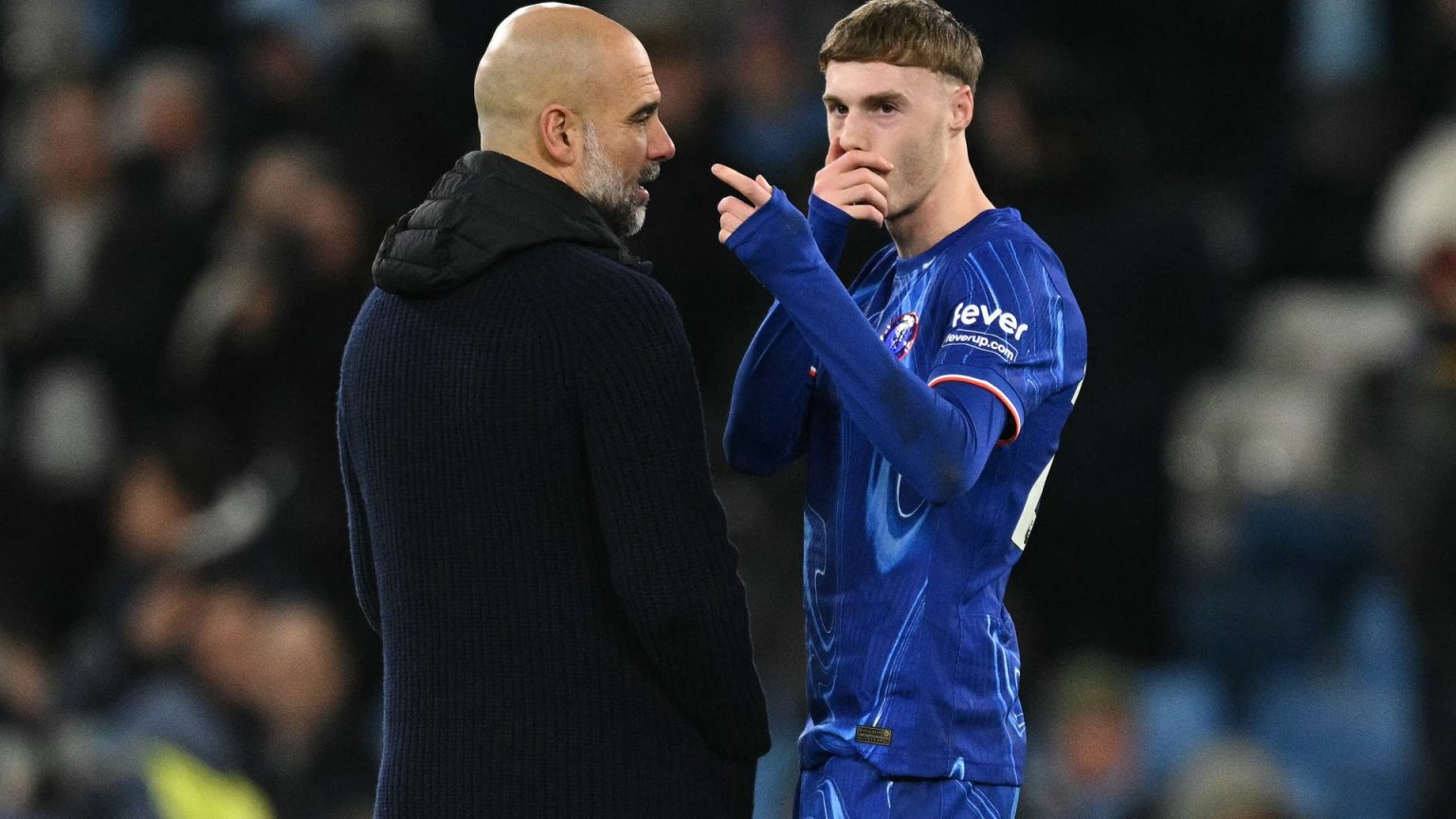Gary Neville’s critique of Cole Palmer’s post-match interaction with Pep Guardiola stems from a perceived lack of professionalism and respect for the traveling Chelsea supporters. Neville argues that Palmer’s performance on the pitch, deemed insufficient by the former Manchester United defender, should have taken precedence over pleasantries exchanged with the opposing manager. The optics of a smiling Palmer engaging in lighthearted conversation with Guardiola after a Chelsea defeat, particularly in front of the dedicated traveling fans, rubbed Neville the wrong way. He interpreted the exchange as a sign of disrespect towards the Chelsea faithful who expected more from their player, especially in the wake of a disappointing result. Neville contends that such interactions should be conducted away from the public eye, respecting the emotional investment of the fans who had witnessed their team’s loss.
Neville’s disapproval extends beyond mere etiquette. He sees a calculated move by Guardiola, suggesting the City manager was “playing” Palmer. The sale of Palmer, despite his undeniable talent, coupled with Guardiola’s limited use of him during his time at City, fuels Neville’s suspicion. He posits that Guardiola’s public display of camaraderie with Palmer, particularly after a City victory, served to subtly undermine the young player and perhaps even the Chelsea team. This interpretation paints Guardiola as a shrewd tactician using the interaction to exert a form of psychological dominance, reminding Palmer of his past and perhaps subtly highlighting his current team’s shortcomings. Neville believes Palmer, in his youthful naiveté, was unwittingly falling prey to Guardiola’s gamesmanship.
The incident sparked a broader discussion about post-match decorum and the appropriate behavior of players and managers. Some fans echoed Neville’s sentiments, criticizing Palmer’s apparent lack of sensitivity towards the disappointed Chelsea supporters. They viewed the interaction as a double standard, arguing that Guardiola often engages in such displays, especially after victories, a practice they find objectionable. The deliberate positioning of Guardiola, seemingly blocking Palmer’s exit route to prolong the on-camera interaction, was also highlighted as a calculated move to maximize exposure and perhaps further emphasize the power dynamic.
Conversely, others defended Palmer and Guardiola, suggesting the interaction was merely a friendly exchange between a former player and his mentor. They questioned Neville’s “old school” perspective, arguing that such interactions are common in modern football and shouldn’t be overanalyzed. The relationship between Guardiola and Palmer, built during the latter’s formative years at City, was cited as justification for a cordial exchange, regardless of the match result. This perspective emphasizes the human element within the highly competitive world of professional football, suggesting that personal relationships should not be completely disregarded even in the context of a fiercely contested game.
The incident underscored the nuanced dynamics of modern football, where the lines between professionalism, sportsmanship, and gamesmanship can often blur. While Neville’s critique focused on respect for the fans and a perceived power play by Guardiola, others viewed the interaction as a harmless exchange within the context of a pre-existing relationship. The divergent interpretations highlight the subjective nature of such incidents and the varying perspectives on what constitutes acceptable behavior within the footballing world. The debate raises questions about the evolving expectations placed upon players and managers, particularly in the highly visible and emotionally charged environment of the Premier League.
The larger context of Chelsea’s recent struggles further intensifies the scrutiny on Palmer’s actions. With just one win in their last five Premier League matches and a drop to sixth place, the fans’ frustration is palpable. This backdrop of underperformance magnifies the perceived insensitivity of Palmer’s exchange with Guardiola, making it appear as a further slight to the already disheartened supporters. The incident, although seemingly minor in isolation, becomes symbolic of the broader discontent surrounding Chelsea’s current form. Palmer’s performance, deemed lackluster by Neville, combined with the post-match interaction, adds fuel to the fire of fan frustration, creating a narrative of disconnect between the players and the supporters. This reinforces the importance of optics and player behavior, particularly during periods of team adversity, where even seemingly innocuous actions can be subject to intense scrutiny and criticism.


